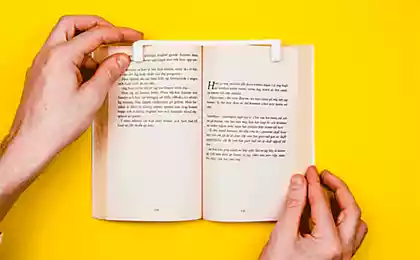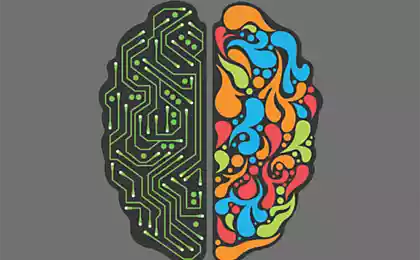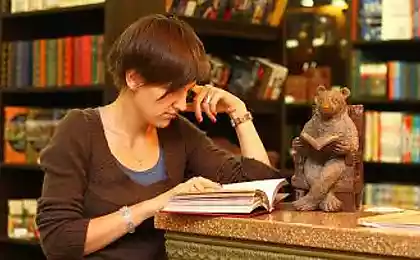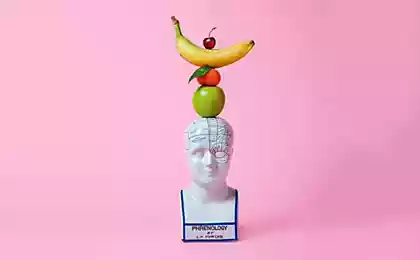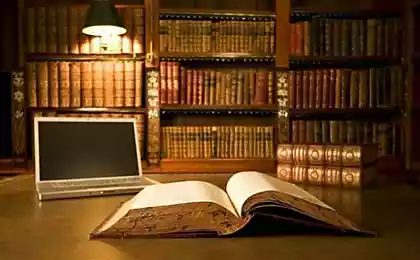218
Speed reading: 10 effective techniques

© Daniel F. Gerhartz
What book did you read last, remember when it was and what did you learn from it? Can't even remember the name? It is not surprising, because, as practice shows, people do not know how to read, lessons in primary school do not count - in the ability to perceive the material, many have not advanced beyond school skills. As you know, in the modern world, the most valuable commodity is information, and in order to master it, it is absolutely necessary to learn how to read correctly. Based on the materials of Pavel Palagin’s bestseller “Speed in practice”, we have prepared several tips that will help you learn to read again, but already much more effectively, and at the same time will prepare you to master the amazing techniques developed by the author of the book.
1. The more diverse literature will be in your life, the easier it will be for you to learn to read effectively. These are not books and documents that you need to read at work - choose for reading training what you find useful for self-development or works of art. The more diverse literature you have in your life, the easier it will be for you to learn to read effectively, work or, say, study materials.
Even if you can not find a convenient time to read, for example, you are constantly in crowded or other noisy places, force yourself to perform this peculiar schedule – so you will learn to focus on the material, regardless of the circumstances.
2. One of the most common mistakes that people make when trying to delve into any material is taking a pose that is inconvenient for effective text perception. Like lying down reading. This position of the body the human brain perceives as a sign of a desire to relax and, accordingly, “relaxes”. Of course, in the end, it is much more difficult to remember and comprehend the material. It is best to read standing or sitting, with a straight back - much more oxygen enters the brain, due to which information processing is much more intensive.
The ideal distance between the eyes and the text is 30-40 cm, with this position, the person’s gaze makes minimal movements and as a result, the eyes are less tired. Thus, the likelihood of vision deterioration with frequent reading decreases.
3. Often the development of complex material requires concentration and intense mental work, but for four to five hours to keep yourself in good shape is quite difficult. Therefore, while reading it is important to take regular pauses – say, every half hour or hour. Breaks are devoted to physical exercises, light gymnastics, this stimulates blood flow to the brain and gives a charge of vitality necessary for further work on the text. Squats and push-ups will not only increase the efficiency of your work, but also have a positive effect on overall well-being.
Another way to maintain strength during mental activity is gymnastics for the hands. The simplest thing is to simply rub your hands (as if you were washing your hands) so that they feel warm. You’ve probably noticed that some people make such movements involuntarily, such as rubbing their hands before signing an important document.
4. Reading should have a specific purpose.
Sometimes people read books without even thinking about what they want to learn from them. Forget about school settings "read books off the summer list at all costs." As in any business, specific goals and actions to achieve them are good in reading. If you have not decided for yourself what you want to achieve by reading a smart book, even after studying it ten times, you are unlikely to get anything useful.
Most importantly, you must have a constructive purpose: what you want to learn and how you intend to put it into practice. In some cases, this eliminates the need to absorb a huge amount of unnecessary material. In a cursory review of the table of contents and the main parts of the material (see the next paragraph), it may turn out that the information you need is contained only on a couple of pages out of several hundred. Imagine how much time you can save!
5. Thanks to the remarkable property of our memory, even superficial acquaintance with information greatly facilitates its perception and memorization As you know, any experienced tourist, if he has to travel through an unfamiliar area, will pre-stock up with maps and try to collect maximum information about the route. Drawing up an approximate plan of action and preparing for all kinds of force majeure is one of the main components of the success of the trip.
The same principle applies when reading any material. After studying the table of contents and viewing potentially necessary pages, it will be much easier for you to remember the necessary information, while not overloading yourself with unnecessary data. Due to the remarkable property of our memory, even superficial acquaintance with information greatly facilitates its perception and memorization.
6. During the reading of the book, you should not try to “swallow” paragraph by paragraph, page by page, as soon as possible, even if it is written very interesting and contains a lot of useful information. Most likely, having finished reading it in this mode, after a couple of days do not remember a single clever thought expressed by the author: “Great book!” What is it? Oh, I don't remember now.
For information to be “registered” in your long-term memory, you can use this
It's called harvesting techniques. It consists of several stages:
After each completed semantic block (paragraph), pause, look away from the text Imagine information from the passage just read in the form of some image - a scheme, a life situation, and so on. In your words, retell the essence of the information received (about yourself or out loud). A pause will help you to focus on the semantic block, creating an image will greatly facilitate the memorization of information, and the retelling will consolidate the result. To understand the information, proceed to the following stages. Ask yourself a few questions about how you can put what you read into practice. Visualize a situation in which you successfully use your new knowledge. Take advantage of the information. If an experience can be implemented in 1-3 minutes, do it immediately. If you need a little more time, use the “Implementation Sheet” technique – take a piece of paper and write down an idea on it that seemed fruitful to you, necessarily indicating where it came from (chapter and paragraph). Many books have special blank pages for notes (usually at the end). When reading literature from electronic media, you can use various services such as Evernote.
7. Read the text carefully.
How many times, reading the material, have you caught yourself thinking about completely foreign things? Before your eyes is a text about the peculiarities of taxation in South Africa, on which you need to make a report tomorrow, and in your head: “Petrol prices have jumped again ...” We will have to decide where to go on vacation. What to cook for dinner tomorrow?”
This is not surprising – the speed of perception of the text is much lower than the speed of our thinking, so while we wade through words and phrases, the brain needs something to do. However, to better understand the meaning of the text, you need to remove unnecessary thoughts and concentrate on the material. This will help the technique “Inclusion in the MIG”. The abbreviation stands for “garbage from the head”.
Stop. Take three deep breaths without exhaling. Attention. Exhale sharply. Let's go. Say the goal you want to achieve by reading the material and get down to business. The first step will help you cleanse the brain of extraneous thoughts and contribute to the saturation of it with oxygen, the second will set you up to perform an action, mobilize attention and strength, and the third will “upload” one main thought into your head by saying it out loud. Of course, while working on the text, you will still be distracted, but much less often. By practicing these exercises regularly, you will train yourself to work as efficiently as possible, not just while reading or in any other situation.
8. If the book is yours, feel free to make notes on the margins, emphasize the necessary phrases, forget about the strict suggestions of teachers and school librarians that “it is not good to spoil books” For better memorization and subsequent effective use of new material, it is worth summarizing the key points of the text. This can be done using the “harvest” and “leaf to implement” techniques (see paragraph 6) – first determine which thought is important to you, and then write it down in your own words. If the book is yours, boldly make notes in the margins, emphasize the necessary phrases, forget about the strict suggestions of teachers and school librarians that “it is not good to spoil books.”
Before reading, read the table of contents and fix it on a piece of paper, and then add the necessary information from each section. Thus, you can fit the whole essence of the book on one or two A4 sheets. Create your book of wisdom, a collection of all your notes.
9. Among your friends there are probably successful, accomplished people - do not miss the opportunity to use their experience. Make a list of areas of your life where you think they are more successful than you are and ask everyone how they have achieved positive results. Find out what kind of books they read, in which courses they received certain knowledge that allowed them to succeed. Perhaps the key to solving your family, professional, and other problems is just around the corner – just hold out your hand. Of course, simply taking a list of references is not enough – you need to carefully read it and put the knowledge into practice (see paragraphs above).
10. To more effectively implement your life goals and just for self-development, periodically read the literature from which you have learned a lot of useful and wise thoughts. Collect a personal library of literature on self-development and do not forget to replenish your treasury of “golden knowledge”. It is likely that by opening the book for the second time, you will again learn a lot. A good book is like a wise man with whom you never get bored. Read the books! published
From Pavel Palagin’s book “Speed in Practice”
P.S. And remember, just by changing your consciousness – together we change the world!
Source: www.factroom.ru/books/pavel-palagin








